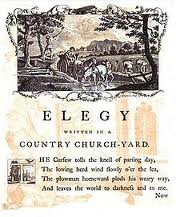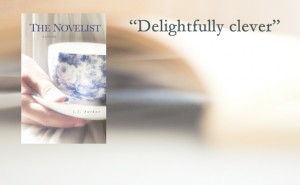I’ve been reading Ursula Le Guin’s new collection of poems, Finding My Elegy: New and Selected Poems (more on that next week), and you can’t see a word like “elegy” without thinking of the most famous elegy of all in the English language.
If there is any poet with whom we associated the elegiac form, or elegy, it is Thomas Gray. The form dates back to Greek and Roman times, and was far broader in subject matter than what we associate with elegies. The ancients used elegiac couplets to describe the mythological, the erotic, the satirical, the playful—and occasionally for epitaphs on tombs. Examples exist of the elegiac form during medieval and later times; John Milton wrote several, for example.
But it was Gray who ensured that the form became tightly connected to funereal subjects and a staple of poetry in the English language—and largely because of one poem, “Elegy Written in a Country Churchyard.”
I can clearly remember my high school senior English class (all boys), as we took turns reading each stanza aloud. A phrase like “some fond breast” would stimulate stifled (and not-so-stifled) giggles, but even the cretins that we were recognized that this was a poem about death, and that it had a breadth and depth and flow that carried us along with it. Our teacher ignored the giggles, closed her eyes, and listened to our young voices read the words.
The curfew tolls the knell of parting day.
The lowing herd wind slowly o’er the lea,
The plowman homeward plods his weary way,
And leaves the world to darkness and to me…
From the beginning to the epitaph at the end, the poem is shot through with meditations, reflections and allusions to death and the end of life. Those first few lines raise the image of approaching night, the worker headed home to rest, and that world of darkness moving through the poet’s imagination.
The poem at times seems inspired by the book of Ecclesiastes, Solomon’s meditation on “vanity, vanity, all is vanity.” Gray sees the individuals high and low, powerful and poor, all eventually come to the same end, and the same kind of forgetfulness, dreams and acts and events all forgotten, only to be remembered perhaps by the herd winding its way “o’er the lea.”
It’s a wonderful poem to read aloud. The language is as beautiful as it is respectful, as if the poet understood that he, too, would be carrying his weary self home soon. And the epitaph is in itself a small masterpiece.

A youth to Fortune and to Fame unknown.
Fair Science frowned not on his humble birth,
And Melancholy marked him for her own.
Large was his bounty, and his soul sincere,
Heaven did send a recompense as largely send;
He gave to Misery all he had, a tear,
He gained from Heaven (‘twas all he wished) a friend.
No farther seek his merits to disclose.
Or draw his frailties from their dead abode.
(There they alike in trembling hope repose),
This bosom of his Father and his God.
Photo by Kelle Sauer. Used with permission, via Flickr. Post by Glynn Young, author of Dancing Priest.
_____________________
Purchase The Novelist, by L.L. Barkat now!
- Poets and Poems: Sandra Marchetti and “Diorama” - April 24, 2025
- Poets and Poems: Christina Cook and “Roaming the Labyrinth” - April 22, 2025
- Longfellow’s “Paul Revere’s Ride”: Creating a National Legend - April 17, 2025


Dave Malone says
Thanks, Glynn, for this reminder of this powerful poem. I, too, was introduced to it in high school. And it was in that senior English course that I changed my course–in part, because of this poem. Having the feeling that there is so much to life. Beyond any teenage angst I might have felt. And the sentiment of this poem stayed with me. And these lines haunted: “Here rests his head upon the lap of Earth / A youth to Fortune and to Fame unknown.” Great post, sir!
Glynn says
Dave – thanks. I’m not sure exactly why, but I’ve been going back and reading the poetry (and some of the novels) I read in high school. It’s like discovering them all over again.
Dave Malone says
That’s really fun. 🙂 Several months ago, I read A Separate Peace again. What a gem that is!